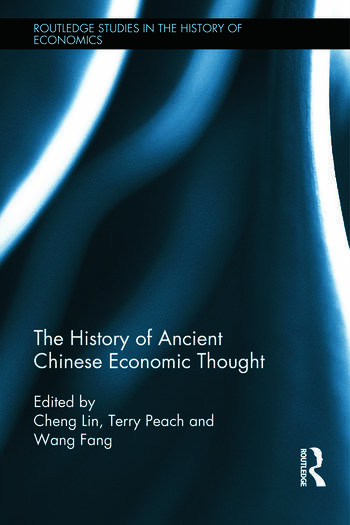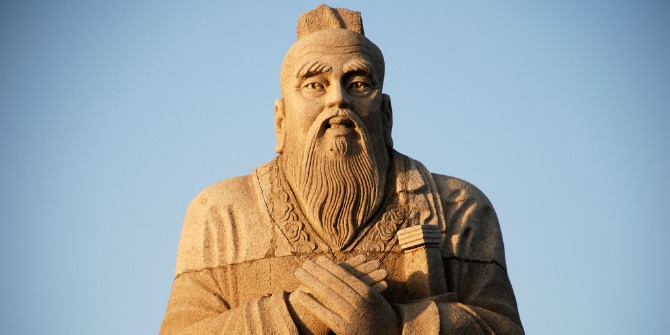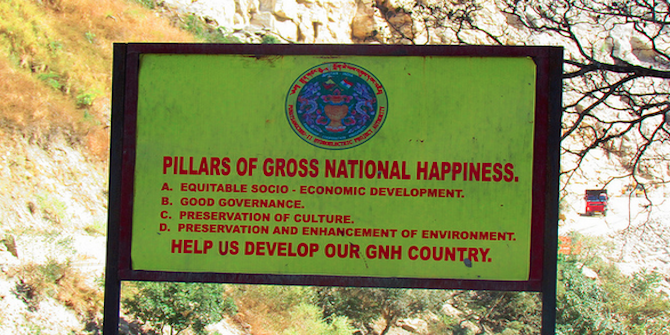This volume comprises twelve papers written by Chinese scholars on various aspects of the history of ancient Chinese economic thought, with the authors aiming to show that ancient Chinese thought has at least as much to offer to the historian as ancient Western thought. The first such volume of papers to be translated into English, this collection will challenge the most experienced of scholars in economics and Chinese studies. Pei Gao applauds the efforts of the authors, but calls for a more accessible contribution to the literature.
 The History of Ancient Chinese Economic Thought. Cheng Lin, Terry Peach and Wang Fang (eds.). Routledge. February 2014.
The History of Ancient Chinese Economic Thought. Cheng Lin, Terry Peach and Wang Fang (eds.). Routledge. February 2014.
What were the main economic ideas proposed by economists in ancient China, and what is their significance for today’s turbulent economic world? These are the questions which one would naturally expect an edited collection like The History of Ancient Chinese Economic Thought to address. Although the contributors cover a wide variety of topic and papers, this book asks the right questions but unfortunately fails to provide satisfactory answers.
Firstly, it must be acknowledged that the volume is anything but accessible. Traditional Chinese classics are frequently cited which create substantial difficulties for readers without knowledge of Chinese, and on occasion the translations can come across as clumsy and awkward (the authors do acknowledge this as their “greatest challenge” in the editorial note). Another difficulty, though more subtle, is that economic theory is often discussed without reference to the broad philosophy systems in which they are deeply embedded. Both of these difficulties mean that the book will be challenging for readers without sufficient background understanding of the topic. Furthermore, this book shows little intention to situate thinkers within the particular economic context of China, even if only briefly. If readers are intent on seeking out a challenging and abstract book on ancient Chinese economic theory, only then is this book a good choice.
The book is arranged into 12 essays and, though they are not ordered by epoch nor by schools or thinkers, we can assign these into two main themes. The first group of papers try to tackle the wider question of the relevance for understanding ancient Chinese economic thought, aiming to pin down its links with modern economic theory. The second group, being more micro-focused and introductory, expressively review the contents, merits, and long-lasting influence of some of the major thinkers in the field.
Chapter 2 sees Wu Baosan consider why we should care about ancient Chinese economic thought. He argues that contributions to the field should be better integrated into the global history of economic thought. This chapter possesses a number of virtues by positioning Chinese economic thought in a global historiography. The author points out that ancient Chinese economic theory in many ways emerged in a similar pattern to ancient economic thought in Europe, mirroring the likes of Aristotle and Plato. Ancient Chinese economic theory is usually only discussed in terms of its contribution to philosophical and political ideas, without reference to a more systematic economic analysis (p.50).
The author then draws on works by Confucius (551–479 BCE), Mencius (372 – 289 BCE), Laozi (4th or 5th century BCE), and Zhuangzi (4th century BC) in an attempt to summarize the key political and economic ideas of both Confucianism and Daoism. This section is an extremely helpful and welcome for readers and enables them to gain a clear picture of the development of economic thought in China.

The subject of Chapter 7, by Zheng Xueyi, stands out as particularly unusual, focusing as it does on family economics of Chinese feudal landowners. Given that the ultimate pursuit of Chinese intellectuals is governing and enriching a country, the main debate regarding economic issues is consequently from a point of view of the state, so this understudied micro-economic perspective is a provocative addition. This chapter uses the example of Important Arts for People’s Welfare – an important classical work on agricultural technology in China – to convey the idea that the foundation of household economics for China’s landowner class was laid out by ancient thinkers far back in history. Recognised as the most completely preserved of the ancient Chinese agricultural texts, Important Arts was written by Northern Wei Dynasty official Jia Sixie, believed to be completed in 544 BCE. Jia Sixie’s starting point – the key significance of the land and the agriculture sector for the nation’s wealth – is shown to be echoed in the work of 18th century French Physiocrats, such as Pierre Samuel du Pont de Nemours. Zheng Xueyi’s argument could be challenged here; though Jia Sixie and the Physiocrats have the same starting point their work ends up in very different directions. Although Important Arts is cited with detailed passages as evidence, it is still difficult to treat it as anything more than a manual book holding information on how to manage agriculture activities for landowners, rather than a full on theoretical economic work.
The intention of this volume is to convince readers that the ideas that we now recognise as key to economics today have their roots in China, as early as in 200 BCE. The demand for this argument to be heard leads to some forced and overstated arguments throughout this collection, and though there is no denying that having an understanding of ancient Chinese economic thought is intellectually stimulating and academically important, it is not necessary to push the envelope too far. The key point lies in that there are so many economic ideas scattered in the enormous volumes of ancient Chinese classics, without pinning down their main arguments within a systematically framework, it is too contentious to label these sparks of intelligence as ‘theories’.
All in all, as an ambitious attempt to introduce ancient Chinese economic thought to English readers, this book certainly deserves applause. Unfortunately, it only scratches the surface of this severely understudied field. Experienced readers may want to challenge themselves by picking this up, but general readers or those without knowledge of the field will be overwhelmed easily. To better serve the function of making Chinese economic thought more relevant and accessible for a wider reading group, a more gentle and articulate introduction which could help one to navigate the various and complicated schools of Chinese economic thoughts is imperatively needed.
——————————
Pei Gao is a PhD student in Economic History Department of LSE. Read more reviews by Pei.








1 Comments